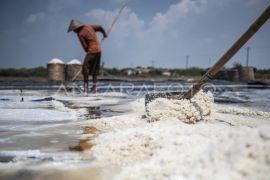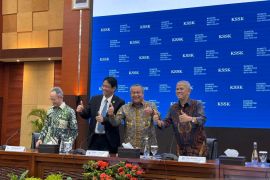At the end of the third quarter of 2019, Indonesia's IIP registered a net liability, totaling US$326.2 billion, or 29.8 percent of the gross domestic product (GDP), lower than $329.6 billion, or 30.9 percent of the GDP, at the end of the previous period, according to a statement from Bank Indonesia received in Jakarta on Friday.
The decline in net liability was fueled by a decrease in the FFL position and an increase in Foreign Financial Assets (FFA).
A decline in Indonesia’s FFL position was chiefly triggered by other factors, including appreciation of the US dollar against the rupiah and a decline in the value of Rupiah-denominated investment instruments in accordance with a correction in the Jakarta Composite Index (JCI).
The decline occurred amid increasing capital inflows, particularly in the form of direct investment and portfolio investment. The FFL position decreased by 0.3 percent (qtq), or $1.9 billion, to reach $691.4 billion at the end of the third quarter of 2019.
Further declines were annuled by the rise in foreign capital inflows in the form of equities, global corporate bond, and Rupiah-denominated Government Securities (SUN).
The increase in foreign capital inflows mirrored investor perceptions of the positive outlook on the Indonesian economy and attractive return on investment in domestic financial assets.
Indonesia’s FFA position increased owing to the rising position of other investment assets and reserve assets.
At the end of the third quarter of 2019, the FFA position expanded 0.4 percent (qtq), or $1.5 billion, to $365.3 billion.
The rise in other investment assets was principally supported by a growth surge of non-resident deposits, while the gain in official reserve assets stemmed from oil & gas and other foreign receipts.
However, further improvements were negated by a stronger US dollar against several major global currencies and the average decline in stock indexes in most investment placement countries.
Bank Indonesia views that Indonesia’s IIP at the end of Q3 of 2019 remained healthy. Such developments were indicated by the domination of long-term instruments within the structure of Indonesia's IIP net liability.
Nevertheless, Bank Indonesia will remain vigilant over the risk of Indonesia’s IIP net liability to the economy.
Going forward, Indonesia’s IIP performance is expected to improve in line with sustained economic stability and persistence recovery of Indonesia economy, supported by consistency and synergy in the policy mix of monetary, fiscal, and structural reforms. Related news: Indonesia's global investment position records increase in Q2 of 2019
Related news: Indonesia`s international investment position remains stable: BI
EDITED BY INE
Reporter: Azis Kurmala
Editor: Suharto
Copyright © ANTARA 2019












